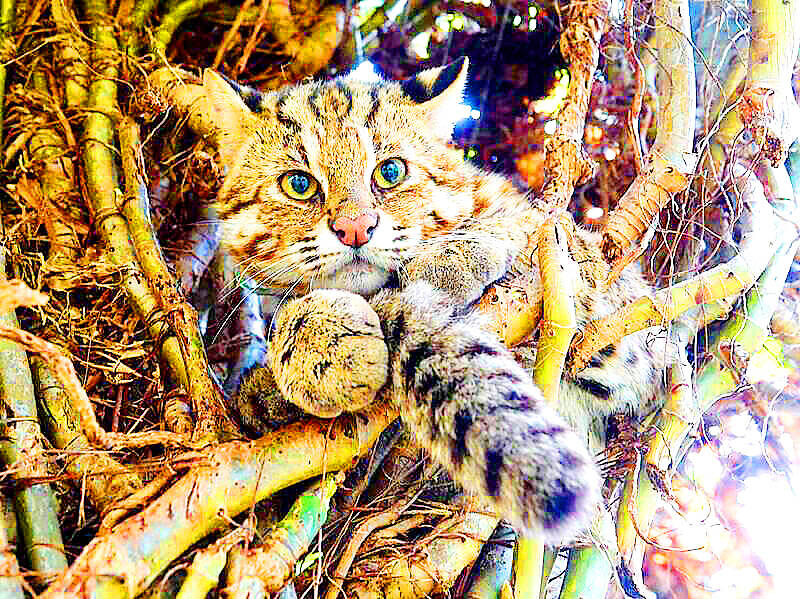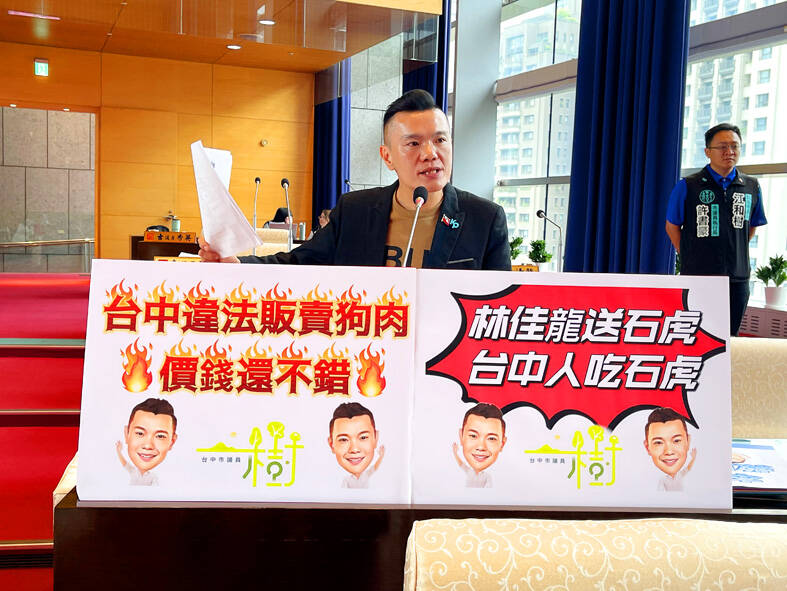Killing companion animals or protected wildlife is punishable by a fine of up to NT$2 million (US$61,489), the Ministry of Agriculture reminded the public on Friday after the alleged sale of dog meat, cat meat and leopard cat meat in Taichung was exposed.
Taichung City Councilor Chiang Ho-shu (江和樹) on Friday told a council meeting that he had received a report saying that cats and dogs retired from breeding farms were allegedly traded to criminal groups and then killed to make so-called “pet supplements” sold on the Internet.
Traces of microchips were reportedly found in the cat or dog meat provided by a seller, while leopard cat meat was allegedly also available, he said, citing the report.

Photo courtesy of the Forestry and Nature Conservation Agency
The ministry’s Department of Animal Welfare Deputy Director Chen Chung-hsing (陳中興) on Friday said that cats and dogs are what the Animal Protection Act (動物保護法) stipulated as companion animals, which may not be killed and their meat may not be sold.
Killing cats or dogs is punishable by a jail term of up to two years and a fine of NT$200,000 to NT$2 million, Chen said.
Buying or eating cat or dog meat is also punishable by a fine of NT$50,000 to NT$250,000, he said.

Photo: Su Meng-chuan, Taipei Times
Sellers’ or buyers’ names and photos might be publicized as allowed by the act, he added.
Permits from authorities must be obtained to breed or sell cats or dogs, and bred companion animals must be microchipped, Chen said.
Breeders and sellers are also required to transparently document sources of their cats or dogs, including those that have been retired or given away, he said, adding the documented data should be regularly reviewed and evaluated by local governments.
Leopard cats are an endangered species listed as conserved wild animals, which may not be hunted or killed without prior permission from authorities, unless they are jeopardizing public safety or people’s lives, carrying infectious diseases, or damaging crops, poultry or livestock, Chen said.
People hunting or killing leopard cats could be penalized by a jail sentence of six months to five years and a fine of NT$200,000 to NT$1 million, he said.
Meanwhile, an animal rights group based in Hsinchu County on Friday said that Chiang’s whistle-blowing at the Taichung City Council was an unauthorized publication of information about an ongoing investigation that allegedly undermined the integrity of the investigation.
The investigation has continued for more than seven months with informants and resources deployed nationwide, including in Taichung, Tainan and Kaohsiung, as well as Hsinchu, Miaoli, Changhua and Nantou counties, it said.
While the effort was about to bear fruits, Chiang improperly exposed the matter in pursuit of personal heroism, causing several suspects to escape and the investigation to end in vain, the group said.
Chiang was also accused of forgery, as he allegedly removed watermarks on the photos and video clips provided by the group and said that he collected the evidence, it said, adding that he also put a Vietnamese undercover buyer’s life in danger by publishing their video clip.
In response, Chiang yesterday said the Taichung Police Department’s Dajia Precinct identified a suspect within six hours after he exposed the alleged wrongdoing.
He said that three representatives from the group visited him at his office on Wednesday and reported the alleged illegal trading, with photos, videos and “a piece of meat” provided as evidence.
“I immediately reported to the local animal protection office to file an investigation statement,” Chiang said, adding that he and his family could be threatened, too, as he was stopping other people from making money.
“If inconvenience was caused due to my mismatch with your [animal rights groups’] pace, I sincerely apologize,” he said.
“However, I made the move simply to have the unscrupulous businesspeople, dog killers or dog meat sellers, arrested as soon as possible,” Chiang added.

Former president Tsai Ing-wen (蔡英文) on Monday called for greater cooperation between Taiwan, Lithuania and the EU to counter threats to information security, including attacks on undersea cables and other critical infrastructure. In a speech at Vilnius University in the Lithuanian capital, Tsai highlighted recent incidents in which vital undersea cables — essential for cross-border data transmission — were severed in the Taiwan Strait and the Baltic Sea over the past year. Taiwanese authorities suspect Chinese sabotage in the incidents near Taiwan’s waters, while EU leaders have said Russia is the likely culprit behind similar breaches in the Baltic. “Taiwan and our European

Hong Kong singer Eason Chan’s (陳奕迅) concerts in Kaohsiung this weekend have been postponed after he was diagnosed with Covid-19 this morning, the organizer said today. Chan’s “FEAR and DREAMS” concert which was scheduled to be held in the coming three days at the Kaohsiung Arena would be rescheduled to May 29, 30 and 31, while the three shows scheduled over the next weekend, from May 23 to 25, would be held as usual, Universal Music said in a statement. Ticket holders can apply for a full refund or attend the postponed concerts with the same seating, the organizer said. Refund arrangements would

Taiwanese indie band Sunset Rollercoaster and South Korean outfit Hyukoh collectively received the most nominations at this year’s Golden Melody Awards, earning a total of seven nods from the jury on Wednesday. The bands collaborated on their 2024 album AAA, which received nominations for best band, best album producer, best album design and best vocal album recording. “Young Man,” a single from the album, earned nominations for song of the year and best music video, while another track, “Antenna,” also received a best music video nomination. Late Hong Kong-American singer Khalil Fong (方大同) was named the jury award winner for his 2024 album

The Taipei District Court sentenced babysitters Liu Tsai-hsuan (劉彩萱) and Liu Jou-lin (劉若琳) to life and 18 years in prison respectively today for causing the death of a one-year-old boy in December 2023. The Taipei District Prosecutors’ Office said that Liu Tsai-hsuan was entrusted with the care of a one-year-old boy, nicknamed Kai Kai (剴剴), in August 2023 by the Child Welfare League Foundation. From Sept. 1 to Dec. 23 that year, she and her sister Liu Jou-lin allegedly committed acts of abuse against the boy, who was rushed to the hospital with severe injuries on Dec. 24, 2023, but did not